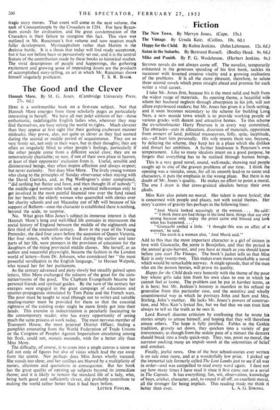The Good and the Clever
Hannah More. By M. G. Jones. (Cambridge University Press. 27s. 6d.) HERE is a workmanlike book on a" first-rate subject. Not that Hannah More emerges from these scholarly pages as particularly interesting in herself. We have all met paler editions of her—those enthusiastic, indefatigable English ladies who, wherever they may ' find themselves, are busy setting the world to rights. Much cleverer than they appear at first sight (for their gushing exuberant manner misleads), they prove, alas, not quite as clever as they had seemed during the second or middle period of acquaintance. They are so very firmly set, not only in their ways, but in their thoughts; they are often so singularly blind to other people's feelings, particularly if the other people come from a different social class; they are so remorselessly charitable; so sure, if not of their own place in hqaven, at least of their opponents' exclusion from it. Useful, sensible and disinterested beings, they often inspire affection and always respect; but never curiosity. Nor does Miss More. The lively young woman who clung to the principles of Sunday observance when staying with the David Garricks, and, as Peg Woffington's sister complained, "did nothing but flatter and fawn, and then thought ill of nobody"; the middle-aged woman who took up a poetical milkwoman only to get involved in the most painful financial row over the fund, raised for her benefit; the elderly woman who quarrelled with clerics over her charity schools and cut Macaulay out of her will because of his support of Reform—once the character is established there is nothing, beyond the scale, to surprise.
No. What gives Miss Jones's subject its immense interest is that Hannah More's long and well-filled life contains in microcosm the social history of England between the middle of the eighteenth and first third of the nineteenth century. Born in the year of the Young Pretender, she died four years before the accession of Queen Victoria. Her four sisters, with whom she lived during the earlier and later parts of her life, were pioneers in the provision of education for the daughters of the rising provincial middle classes. She herself, as an author and successful playwright, became the fashion in the London world of letters—from Dr. Johnson, who considered her "the most powerful versificatrix in the English language," to Horace Walpole, who teased her for her puritanism.
As the century advanced and piety slowly but steadily gained upon letters, Miss More exchanged the-saloons of the great for the com- mittee:rooms of the good. The Clapham Evangelicals became her personal friends and spiritual guides. By the turn of the century her energies were engaged in the great campaign of education and counter-propaganda stimulated by Tom Paine and the French wars. The poor must be taught to read (though not to write) and suitable reading-matter must be provided for them so that the essential rightness of the existing order might be more firmly got into their heads. This exercise in indoctrination is peculiarly fascinating to the contemporary reader, who has every opportunity of seeing much the same process at work today. The most nervous member of Transport House, the most paternal District Officer, finding a pamphlet emanating from the World Federation of Trade Unions or the Congress of Peoples Against Imperialism circulating among his flock, could not, mutatis mutandis, wish for a better ally than Miss More.
The difficulty, of course, is to cram into a single canvas a scene so full not only of figures but also of vistas which lead the eye away from the centre. Nor perhaps does Miss Jones wholly succeed. She stands too close, and her outlines are blurred-by a multiplicity of names, allusions and quotations in consequence. But her book has- the great quality of opening up subjects beyond its immediate theme; and it is likely to remain the standard life of a lady, who, being both good and sufficiently clever, did probably contribute to making the world rather better than it had been before.
LETTICE FOWLER.


































 Previous page
Previous page